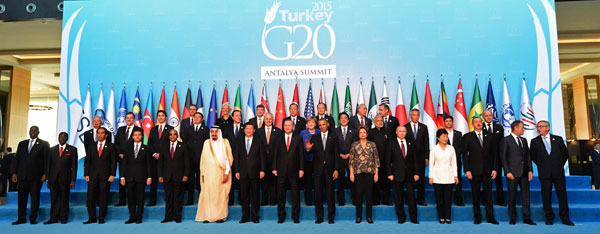President Jacob Zuma is to travel to Antalya, Turkey today, 13 November 2015, to attend the G20 Summit which will take place on 14-16 November 2015.
The G20 brings together the world's major advanced and emerging economies.

It was originally established as a forum for Finance Ministers and Central Bank Governors, in response to the Asian financial crisis of the late 1990s, in order to prevent another regional or global financial crisis and in recognition that key emerging-market countries had to be included in global economic discussions and governance. South Africa has been a member of the G20 since its inception in 1999.
Since the elevation of the G20 from a Finance Ministers forum to a Head of States and Government Summit level, the agenda and work of the G20 has expanded beyond financial matters to include a wide range of issues such as trade, climate change financing, energy, food security, commodity price volatility, employment, anti-corruption, marine environment protection and development.
The Antalya Summit agenda includes sessions on: development and climate change; the global economy; growth strategies, employment; investment strategies (inclusive growth); financial regulation, international tax, anti-corruption and IMF reform (enhancing resilience), trade and energy. Moreover, the Summit will also seek to address current global challenges such as terrorism and the refugee crisis.
For South Africa, the G20 presents meaningful opportunities for advancing much-needed global governance reforms for promoting Africa's sustainable development agenda.
The G20 Leaders are expected to discuss the G20 commitments made during the Brisbane Summit in 2014 - to contribute an additional 2 per cent to global growth in 5 years' time, above the levels prevailing at the time of the St Petersburg G20 Summit in 2013. To meet this commitment, the Brisbane Summit agreed on the need for member countries to develop national growth strategies. In 2015, the Turkish Presidency has put a lot of focus on implementation by member countries of their growth strategies.
South Africa seeks to use its participation in the G20 to promote and strengthen the interests of Africa and of the South, on the understanding that, if managed carefully, the G20 presents meaningful opportunities for advancing much-needed global governance reforms and orienting the international development agenda.
South Africa's priorities in the G20 for 2016 include strong, sustainable, balanced and inclusive growth, decent employment, efficient and responsive economic infrastructure, increased investment in infrastructure, reducing illicit financial flows through coordination in the international tax regime, coordination of international financial regulatory developments and international coordination on development (including in the context of domestic resource mobilisation (DRM) and ensuring synergy with the UN processes on the post-2015 development agenda and financing for development).
South Africa also supports calls for the G20 to show international leadership in helping to achieve progress in multilateral institutions, on the understanding that the G20 is not a substitute for the UN system, but should support and add value to what is being done within the UN context.
The President will also attend a meeting of the BRICS leaders on the margins of the G20 where they will take forward the programme agreed to at the last summit in Ufa, Russia. The BRICS leaders meet customarily on the margins of the G20.
The G20 Summit takes place against the background of a gloomy global economic climate, which has affected the South African economy immensely, in addition to domestic constraints.
South Africa's economy is expected to expand at a pace of 1.4 per cent this year and around the same rate next year. Key risks to higher growth levels for the economy are electricity constraints, lower commodity prices and the slowdown in China.
To support growth, South Africa remains committed to pursuing prudent macroeconomic policies as well as implementing structural reforms set out in the National Development Plan.
Progress has been made by the government in taking steps to reduce the binding constraints to long term growth. For example, government has increased electricity generation by 800 megawatts and Eskom has been placed on a financially sustainable path and its management is in place. The Renewable Energy IPP is expected to add up to 3000 megawatts of generation capacity.
The President will be accompanied by the Minister of Finance, Mr Nhlanhla Nene.
Enquiries:
Bongani Majola
Cell: 082 339 1993
E-mail: bonganim@presidency.gov.za





